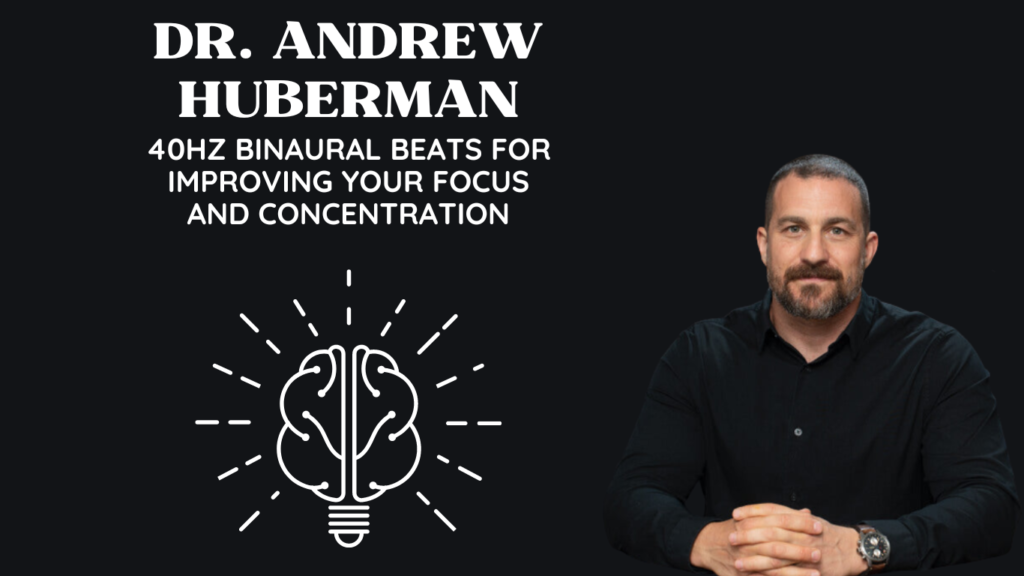Omega-3 fatty acids have long been regarded as a key component of a healthy diet, but their significance extends far beyond mere nutrition. These essential fats, primarily found in certain types of fish, have captured the attention of researchers and health experts due to their potential therapeutic benefits. From promoting heart health to supporting brain function, omega-3s have been associated with a wide range of positive effects on the body and mind. In recent years, renowned neuroscientist Dr. Andrew Huberman has delved into the realm of omega-3s, uncovering intriguing insights that shed light on their potential impact on mental well-being. In this article, we explore Dr. Huberman's research and delve into his findings, revealing the fascinating role that omega-3 fatty acids may play in our overall health and vitality.
Note: If you're in a hurry or too lazy to read the whole article, you can find a tl;dr at the end.
The Benefits of Omega 3 for ADHD and Focus
Effects on Focus, Attention and ADHD
Dr. Huberman discusses the impact of omega-3 fatty acids on focus and attention, particularly in individuals with ADHD or mild attention deficit issues. Several studies suggest that omega-3s may have positive effects on these cognitive functions. While the effects are not significant, they are typically considered modest. It is worth noting that conflicting research exists, with some studies showing no noticeable impact. However, similar to the relationship between omega-3s and antidepressants, Dr. Huberman points out that consuming one gram or more of EPA per day can help individuals with ADHD function effectively on lower doses of medication, and in rare cases, even eliminate the need for medication entirely.
Mood Elevation and Antidepressant Effects
Dr. Huberman emphasizes the antidepressant effects of omega-3 fatty acids, specifically the EPA component. Research has shown that consuming one gram (1000 milligrams) or more of EPA daily can have a positive impact on mood and elevate overall well-being. These fatty acids are known to play a vital role in enhancing mood and mitigating symptoms of depression. Additionally, studies have highlighted the cardiovascular benefits associated with omega-3 fatty acids, further strengthening the case for their inclusion in our diets.
The Remarkable Impact of Omega-3 Fatty Acids on Mood and Depression, According to Dr. Andrew Huberman
Omega-3 fatty acids have long been recognized for their numerous health benefits, but their profound impact on mood and depression is a discovery that many people are unaware of. Dr. Andrew Huberman, highlights the compelling scientific evidence supporting the role of omega-3s in influencing depression and mood. In this article, we delve into Dr. Huberman's insights and discuss the transformative potential of omega-3 fatty acids.
The Omega-3 to Omega-6 Ratio
Dr. Huberman emphasizes a simple yet often overlooked fact: the ratio of omega-3 to omega-6 fatty acids in our diet has a significant influence on depression. While many individuals are familiar with omega-3s and omega-6s, few understand their profound impact on mental health. Several studies, including a double-blind placebo-controlled study published in 2008, have demonstrated the critical role of this ratio in depression management.
Animal Studies
Animal studies provide compelling evidence for the antidepressant effects of omega-3 fatty acids. In experiments involving rats or mice subjected to a model of learned helplessness, increasing the omega-3 to omega-6 ratio led to reduced learned helplessness. Animals exhibited increased resilience and endurance when faced with challenging situations. While these studies are not without ethical concerns, they offer valuable insights into the potential benefits of omega-3s.
Human Studies
Similar results were observed in human studies. In a study involving individuals diagnosed with major depression, the effectiveness of omega-3s was compared to that of the antidepressant Fluoxetine (Prozac). Surprisingly, the study revealed that a daily dosage of a thousand milligrams of EPA (a component of omega-3s found in fish oil) was equally effective in reducing depressive symptoms when compared to 20 milligrams of Fluoxetine. Furthermore, combining EPA and Fluoxetine demonstrated a synergistic effect, further lowering depressive symptoms.
The Mechanism of Action
Dr. Huberman explains that the beneficial effects of omega-3 fatty acids on depression are not solely limited to neurotransmitter regulation. Instead, it involves a complex interplay between the gut, autonomic nervous system, and heart rate variability (HRV). Omega-3s impact the gut, influencing the signaling between the heart and the brain via the vagus nerve. By increasing HRV, which is associated with improved autonomic nervous system function, omega-3s contribute to symptom relief in depression.
Omega-3 Sources and Considerations
Omega-3 fatty acids can be obtained from various sources, including fatty fish, flax seeds, chia seeds, and supplements like fish oil. However, it is essential to consider factors such as sustainability, potential contaminants like mercury, and personal preferences when choosing an omega-3 source. Dr. Huberman suggests consulting with a healthcare professional and selecting reputable brands that prioritize purity and quality.
Holistic Approach to Mental Wellbeing
While omega-3 fatty acids offer promising benefits, Dr. Huberman emphasizes that they should be viewed as part of a holistic approach to mental wellbeing. No single compound or nutrient can replace a comprehensive lifestyle that includes proper sleep, exercise, social connection, and a balanced diet. Omega-3s serve as an essential piece of the puzzle, complementing these lifestyle factors and potentially enhancing the effects of other treatments.
The groundbreaking research highlighted by Dr. Andrew Huberman underscores the profound impact of omega-3 fatty acids on mood and depression. The omega-3 to omega-6 ratio, the antidepressant effects observed in animal studies, and the synergistic relationship with conventional antidepressants demonstrate the transformative potential of omega-3s. By understanding the role of omega-3 fatty acids in mental well-being and incorporating them into a holistic lifestyle, individuals may experience significant improvements in their mood and overall quality of life.
The Impact of Omega-3 Fatty Acids on Brain Function, According to Dr. Andrew Huberman
Omega-3 fatty acids, specifically EPAs (eicosapentaenoic acids), along with other essential nutrients such as phosphatidylserine and choline, have been shown to have a positive effect on brain function. Dr. Andrew Huberman emphasizes the potential of these compounds to improve cognitive abilities, although the extent of improvement may vary depending on an individual's baseline brain function.
Numerous studies have explored the effectiveness of these compounds, particularly in individuals with mild or severe cognitive decline. While the outcomes of these studies differ, the importance of maintaining brain function throughout our lives and the fact that our brains do not generate new neurons make these nutrients essential components of a healthy diet.
Dr. Huberman suggests that incorporating quality, healthy foods containing these compounds into our daily intake is crucial. The benefits they offer to brain function are evident to some degree. As a result, many individuals seek guidance on how to include omega-3 fatty acids in their routine.
Dr. Huberman shares his personal approach to consuming fish oil, which is one of the primary sources of omega-3s. He prefers the liquid form due to its convenience and affordability for most people. Various liquid fish oil products are available, some of which are flavored with lemon to mask the natural taste of fish oil. Dr. Huberman personally takes one to two tablespoons of liquid fish oil per day. However, when he travels, he resorts to the capsule form to meet his desired dosage.
To clarify, Dr. Huberman emphasizes that his goal is to consume two to three grams of EPA per day, not just two to three grams of fish oil. When he occasionally consumes fish in his diet, he adjusts the amount of fish oil intake accordingly, as fish serves as an additional source of omega-3s.
In conclusion, the evidence suggests that omega-3 fatty acids, including EPAs, play a vital role in supporting brain function. Dr. Andrew Huberman's personal approach involves incorporating fish oil, particularly in liquid form, into his daily routine to ensure an adequate intake of EPA. However, it is essential for individuals to consider their specific dietary needs and consult with healthcare professionals before making any significant changes to their diet or supplementation.
Omega-3: Exploring Their Potential Impact on Bipolar Disorder
Bipolar disorder is a complex mental health condition characterized by recurring episodes of mania and depression. While medication remains the primary treatment approach, emerging research suggests that certain lifestyle interventions and nutritional supplements, such as omega-3 fatty acids, may play a supportive role in managing the symptoms of bipolar disorder. In this article, we delve into the insights shared by Dr. Andrew Huberman, regarding the potential benefits of omega-3 fatty acids in bipolar disorder management.
1:52:00 – 2:06:50
The Power of Lifestyle Interventions
Before discussing omega-3 fatty acids specifically, Dr. Huberman emphasizes the importance of holistic approaches to support individuals with bipolar disorder. Lifestyle interventions, including healthy sleep patterns, regular exercise, proper nutrition, social interactions, and light exposure regulation, contribute to the overall well-being of both the nervous system and the psyche. These factors indirectly influence the likelihood and intensity of bipolar episodes, particularly depressive episodes.
The Role of Omega-3
Among the various nutritional supplements explored for their potential impact on bipolar disorder, two substances stand out: inositol and omega-3 fatty acids. Inositol, a compound with multiple uses, has been found to improve sleep quality and possess anti-anxiety effects. However, its application in managing bipolar disorder is not the primary focus of this article.
Omega-3 fatty acids, primarily found in fatty fish and fish oil, have garnered significant attention for their potential benefits in bipolar disorder management. When consumed, omega-3 fatty acids can incorporate into cell membranes, including those of neurons, altering their fluidity and influencing their functioning.
Research Findings on Omega-3 and Bipolar Disorder
The research on omega-3 fatty acids and bipolar disorder has produced varied results. Some studies have shown no significant effects, while others demonstrate positive outcomes. A study conducted by Murphy et al. in 2012 found that high-dose omega-3 supplementation (4 grams per day) worsened manic symptoms over a 16-week period. Conversely, a study in 1999 administered a higher dosage of omega-3 fatty acids (9.6 grams of fish oil per day for four months) and reported a significant reduction in bipolar depression symptoms compared to a control group receiving olive oil.
The Takeaway
While it is essential to approach omega-3 fatty acid supplementation with caution, it appears to offer benefits for a considerable number of individuals with bipolar disorder. Notably, it shows potential for reducing symptoms of depressive episodes and may even have a positive impact on manic symptoms, as suggested by some studies.
However, it is crucial to emphasize that omega-3 supplementation should not be viewed as a standalone treatment for bipolar disorder. Comprehensive management of the condition involves a combination of high-potency prescription drug treatments, talk therapy, lifestyle interventions, and nutraceutical or supplement-based approaches. This multifaceted approach is necessary due to the complexity and severity of bipolar disorder, which carries a high risk of suicide and significant personal and social challenges.
Exploring the Mechanisms
Research has delved into the mechanisms by which omega-3 fatty acids affect the brains and neural circuits of individuals with bipolar disorder. Brain imaging studies have shown that omega-3 fatty acid supplementation can increase the fluidity of cell membranes in neurons, contributing to neuroplasticity—the brain's ability to change and adapt. Furthermore, these changes bring the neural circuits of individuals with bipolar disorder closer to those of healthy individuals.
While further research is needed to fully understand the impact of omega-3 fatty acids on bipolar disorder, current evidence suggests that they hold promise as a complementary intervention. Omega-3 supplementation may help reduce depressive symptoms and potentially alleviate manic symptoms in individuals with bipolar disorder. However, it is important to note that the effects of omega-3 fatty acids can vary from person to person, and more research is needed to establish optimal dosages and treatment protocols.
Omega-3 Fatty Acids: A Promising Tool for Alleviating Depression Symptoms
In recent years, the role of omega-3 fatty acids in mental health has gained significant attention. Dr. Andrew Huberman, sheds light on the potential benefits of omega-3s, particularly EPA (eicosapentaenoic acid), in relieving symptoms of depression. He highlights findings from numerous high-quality peer-reviewed studies that demonstrate the anti-inflammatory properties of EPA and its positive impact on depressive symptoms, comparable to selective serotonin reuptake inhibitors (SSRIs), commonly prescribed antidepressant medications.
59:20 – 1:05:25
While Dr. Huberman emphasizes the importance of consulting a physician before making any changes to antidepressant treatment, he underscores the potential value of increasing EPA intake. Studies indicate that higher levels of EPA omega-3 fatty acids can lead to relief from depressive symptoms and potentially reduce the required dosage of antidepressant medication, minimizing the risk of side effects associated with higher doses.
The recommended threshold level of EPA intake appears to be around one gram or 1000 milligrams. When considering omega-3 supplements, it is crucial to assess the EPA content specifically, as it is the primary component associated with these benefits. Dr. Huberman suggests that individuals who take two grams of EPA may experience even greater improvement in depressive symptoms.
It is worth noting that the effects of EPA on cardiovascular health are somewhat more complex, with mixed results from various studies. However, it is generally agreed that increasing EPA intake contributes to a 9% improvement in cardiovascular health for every gram of EPA ingested.
The mechanism by which EPA alleviates depressive symptoms is believed to involve its impact on inflammatory cytokines, which can inhibit the release and synthesis of neurotransmitters like serotonin, dopamine, and norepinephrine. Dr. Huberman explains that inflammatory cytokines redirect tryptophan, an amino acid precursor to serotonin, towards a neurotoxic pathway instead of its conversion into serotonin. By reducing inflammatory cytokines, EPA helps ensure that tryptophan is utilized for serotonin production, ultimately promoting healthier levels of serotonin associated with improved mood.
While the biochemical pathways involved may seem intricate, the takeaway is that EPA supplementation can counteract the diversion of tryptophan towards a neurotoxic pathway, potentially leading to a more favorable balance of serotonin in the brain.
Dr. Huberman acknowledges that the precise dosage and individual responses to EPA may vary. However, for many individuals with major depressive symptoms, supplementation with 1000 to 2000 milligrams of EPA could offer substantial relief. It is important to remember that depression is a complex condition, and omega-3 fatty acids should be viewed as a complementary approach, not a standalone solution.
In addition to EPA supplementation, Dr. Huberman emphasizes the significance of regular exercise in combating depression. Physical activity, when combined with the potential benefits of EPA, can act as a powerful tool in mitigating the effects of this mental health condition.
As the understanding of omega-3 fatty acids and their effects on mental health continues to evolve, the research conducted thus far points to their potential as a valuable adjunctive treatment for depression. Nonetheless, it is essential to consult with healthcare professionals to determine the most appropriate course of action based on individual needs and circumstances.
In conclusion, while omega-3 fatty acids, particularly EPA, offer a promising avenue for relieving depressive symptoms, their usage should be approached with guidance from medical professionals. By integrating EPA supplementation, regular exercise, and conventional treatments, individuals with depression may enhance their overall well-being and potentially reduce their reliance on higher doses of antidepressant medication.
TL;DR: Omega-3 fatty acids, specifically EPA (eicosapentaenoic acid), have shown significant potential in improving mood, alleviating depressive symptoms, and supporting brain function.
Dr. Andrew Huberman highlights the importance of the omega-3 to omega-6 ratio in depression management and discusses the antidepressant effects observed in animal and human studies. Omega-3s impact the gut and autonomic nervous system, contributing to symptom relief in depression.
They can be obtained from fatty fish, flax seeds, chia seeds, or supplements, but sustainability, contaminants, and personal preferences should be considered. While omega-3s offer benefits for ADHD and focus, they should be seen as part of a holistic approach to mental well-being.
In bipolar disorder, omega-3s may help reduce depressive symptoms, but comprehensive management involves multiple interventions. The mechanisms behind the effects of omega-3s on bipolar disorder are still being explored.
Omega-3s, particularly EPA, have shown anti-inflammatory properties and comparable efficacy to antidepressant medications in relieving depressive symptoms. Increasing EPA intake can potentially reduce the required dosage of antidepressants. EPA impacts inflammatory cytokines, promoting serotonin production and improved mood.
The recommended threshold level of EPA intake is around one gram, but individual responses may vary. Exercise, combined with EPA supplementation, can further enhance the effects. It is important to consult with healthcare professionals to determine the most suitable approach based on individual circumstances.





